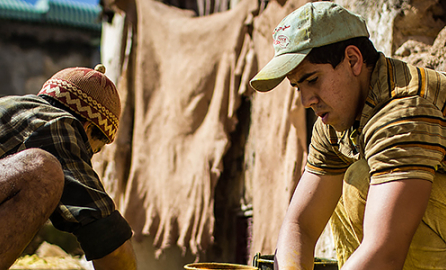Like its North African neighbours, Morocco has long been the gateway into Europe for people from sub-Saharan Africa. In recent years, it has also become a country of destination. Head of EU Cooperation Philip Mikos discusses what Member States can learn from Morocco’s experience and explains how the country’s status as a Neighbourhood partner affects its cooperation with the EU on areas from vocational training to gender equality.
Capacity4dev (C4D): What are the key areas of EU cooperation with Morocco?
Philip Mikos (PM): The EU has a very broad portfolio of cooperation that extends over the three domains captured in the EU-Morocco cooperation framework: basic social services, economic development and good governance.
The broad scope of EU support is justified by the very broad reform programme that Morocco has initiated with its new constitution in 2011. We’ve managed to accompany these reforms in a large number of areas, including social protection, health and education sectors, but also agriculture, forestry, vocational training and migration, regulatory reforms, justice and literacy.
C4D: Speaking of migration, Morocco is the first country in the region to develop a legal policy that offers residence permits to migrants from sub-Saharan Africa. What prompted this development?
PM: Morocco is a peculiar case. It used to be a country of origin, and it’s a transit country, because a lot of migrants have crossed it on their way to Europe. But it’s also becoming an attractive place in itself, with many people from sub-Saharan Africa treating it as their final destination – particularly as Morocco does not require a visa for nationals of several western African countries. So Morocco has had to look at migration from all these different angles and they eventually developed a policy that aims to assist, accompany and integrate those immigrants who have benefitted from a process of regularisation.
Of course, with 25,000 people who have been regularised, and another 15,000 to 20,000 waiting for a decision, the number of immigrants in Morocco is much smaller, compared to Europe. Still, it’s very interesting to see how a society is adapting to the same challenges we have – the cultural differences, the lack of jobs and training, and so on.
In the following video, Philip Mikos, EU Head of Cooperation in Morocco, shares his views on the migration policy implemented by Morocco.
C4D: What other challenges are you noticing in Morocco?
PM: The country has a large jobless population that includes many young graduates – people who have completed all of the available education, but cannot get a job. This youth often struggles to find even the most basic opportunities to improve their living. This, beyond being a waste of human capital, is also dangerous, as it creates a lot of frustration.
One of the projects we’re supporting is on vocational training. A recent reform in Morocco has integrated the department of vocational training into the education ministry. Therefore, when you decide to go into vocational training, you can continue your formal education, or vice-versa. The objective is to reduce the stigma around vocational training, since it’s often seen as a last resort for people who can’t make it in the traditional schooling system.
The reform has created a lot of targeted training opportunities, and it seems to be working. There are huge possibilities here, but the challenge for now is to ensure that the existing vocational programmes go hand in hand with job creation, and the needs of the private sector. Making use of the Neighbourhood Investment Facility [NIF], we’re financing a project that creates new opportunities in the renewable energy sector, for example. This includes training on how to build solar panels, repair heat pumps, and so on.
The project benefits from the blending instrument that combines EU grants with loans from European development banks. It was initiated by the French Development Agency, which provided the Moroccan government with a loan to set up vocational training facilities. We’ve blended that loan with our contribution from the NIF to make it more affordable, basically.
We’re also thinking of setting up twinning programmes. These already exist between universities, so why not have them between private companies? We could create apprenticeships in Europe that would take in promising young people from Morocco.
C4D: How do you reach out to the private sector in Morocco?
PM: The EU is working on providing credit to private sector companies, especially the micro- and small-sized enterprises. Morocco has quite an elaborate banking sector, but to minimise risks the banks tend to always lend to the same companies that are well integrated into the economy. This leaves out start-ups and new companies – and these are the real job creators.
So we’re working on changing that, with the use of the NIF, by providing guarantees for banks so they can increase their level of risk-taking. It’s really a matter of bringing banks around to open up to new clients. The future of Morocco clearly lies in those small companies, both in terms of increasing their capacity to invest, but also because they’re much more flexible and dynamic when it comes to responding to the needs of the economy.
|
EU-Morocco relations The Association Agreement, which entered into force in 2000, represents the legal basis for EU-Morocco relations. With the launch of the European Neighbourhood Policy in 2004, Morocco has gradually become a privileged partner of the EU in the field of political and economic cooperation as well as trade and technical and development cooperation. The European Neighbourhood Instrument [ENI] is the key financial instrument supporting the EU’s cooperation with Morocco for the period 2014-2020. Other funding sources in addition to the ENI include thematic cooperation programmes – for example on human rights, or civil society. EU assistance to Morocco takes mainly the form of dedicated Annual Action Programmes funded every year under the ENI. In addition, Morocco also benefits from regional and Neighbourhood-wide cooperation programmes also funded under the ENI. Finally, Morocco benefits from funding under the EU Emergency Trust Fund for stability and addressing root causes of irregular migration and displaced persons in Africa. This Trust Fund support to northern Africa is managed by the Directorate General for Neighbourhood and Enlargement Negotiations [DG NEAR]. For more information visit EU Neighbourhood Policy. |
C4D: Do you do joint programming?
PM: Yes, we’ve been at it for two years. But it’s a complex endeavour, and Morocco is not the easiest country to do joint programming in, because it has some characteristics that we don’t find in other countries. For one, it’s a country where development aid plays a relatively limited role, and very few EU development partners provide grant funding. Similarly, donors work on a variety of themes, so there is little to gain from having a joint strategy. Hence, after having attempted to go for a common, overall EU strategy, we have agreed to restrict joint programming to three sectors where there is scope for greater EU coordination – these are migration, vocational training and gender equality.
C4D: Why gender equality?
PM: Morocco is one of only a handful of countries with a gender ministry, called the Ministry of Family, Solidarity, Equality and Social Development. The ministry is responsible for an intergovernmental plan on gender equality, and it has introduced an ambitious reform that aims to provide women with equal rights and easier access to jobs and education – give them more autonomy and rights, basically.
I think it was only logical for the EU, which has a value-based intervention in Morocco, to support the reform, and we’ve been financing it through budget support since 2013. Budget support is the right tool, because you have indicators that are linked to the reform’s implementation, and it is accompanied with substantial policy dialogue with the government, as well as support from the Council of Europe on improving legislation. So it’s been quite an interesting process.
C4D: Morocco is designated as a Neighbourhood partner country. How does this status affect your Delegation? Do you mostly collaborate with Delegations in other Neighbourhood countries, or do you also work with delegations in other parts of Africa?
PM: It’s difficult to work across regions, because it’s difficult for the EU institutions to work with different instruments, each one having its specific geographical scope. But a lot of the countries in Western Africa are concerned by migration – and, like Morocco, they benefit from the EU Emergency Trust Fund [EU ETF] – so I think it makes sense to collaborate with the Delegations there, and the EU ETF gives us a financial tool to do just that.
In the following video, Philip Mikos reflects on Morocco’s cooperation with the EU and its importance in the region.
But if you read the European Neighbourhood Policy, we don’t have the exact same objectives when it comes to development. In our work, you will not find much use of the word poverty. Instead, you will hear more about sustainability, equality, rights and partnerships. This has to do with the fact that Morocco is very close to being a middle-income country, so it makes less sense to look at our role in terms of traditional development cooperation.
Instead, we use instruments like the twinning projects between European and Moroccan administrations, where they work together on reforms, drafting legislation, reforming the administrations and so on. We also have a trade agreement, through which Morocco has been adapting its market rules and regulations. Finally, the EU and Morocco are in the process of negotiating the Deep and Comprehensive Free Trade Agreement, or DCFTA, which we accompany with substantial support for regulatory convergence.
The country is also important for us in terms of our cooperation with the countries in the wider region. Traditionally Morocco has looked to the European experience to design its way forward. Since 2016, however, it has re-joined the African Union, and it has been turning more and more towards its neighbours to the south – making it, in my opinion, an interesting bridge between Europe and Africa.
For more information on EU-Morocco cooperation visit Delegation of the European Union to Morocco.
Image credit: Christopher L. / Flickr via Creative Commons license 2.0





Log in with your EU Login account to post or comment on the platform.